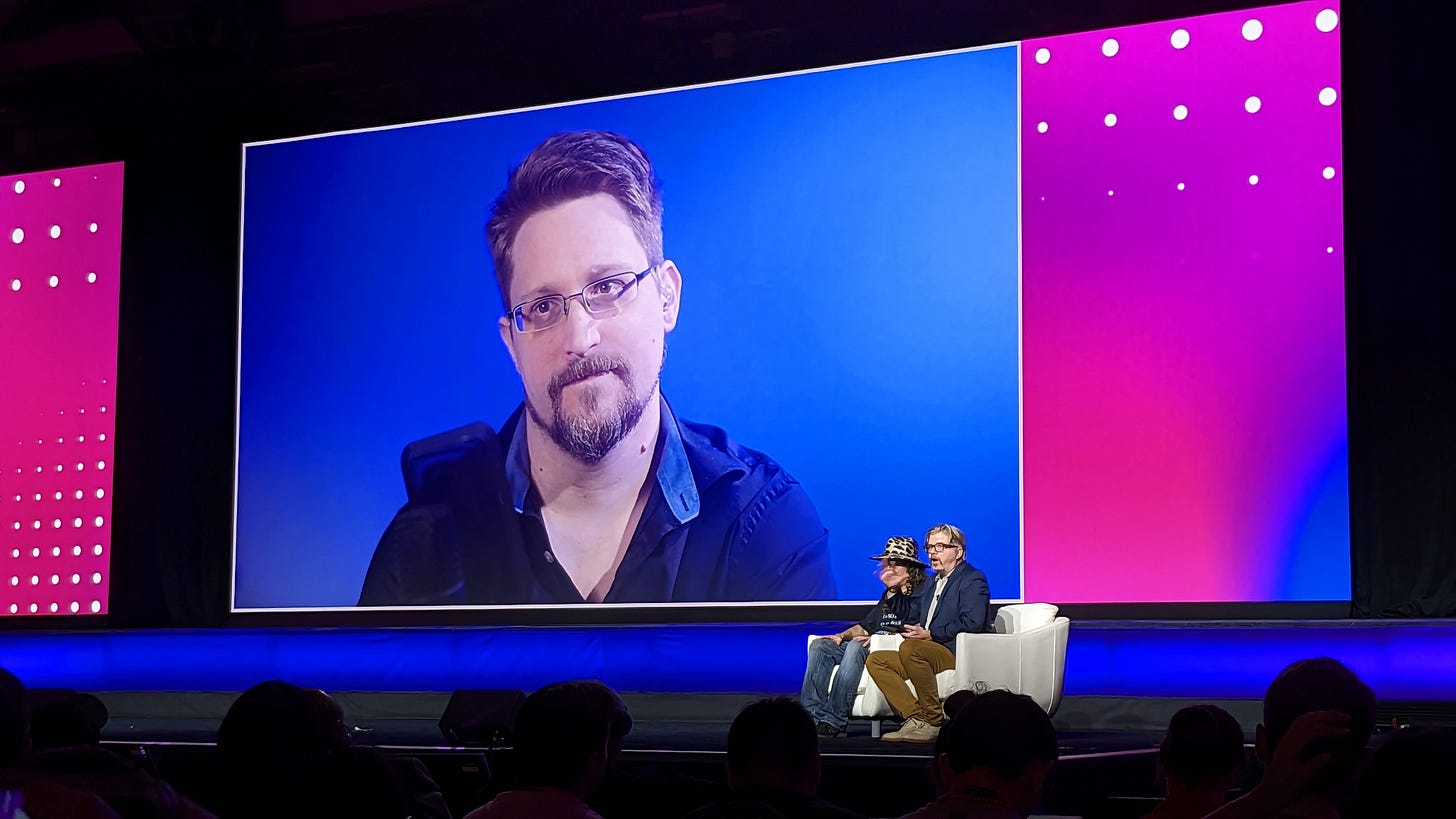Consensus 2023 Recap and Thoughts
Thoughts and opinions after Coindesk's most recent conference in Austin
This is going to be a bit of a different post this week.
Last week I had the opportunity to travel to Austin to attend Consensus 2023. Although self-proclaimed, Consensus is definitely one of the more serious and focused crypto conferences, and for a relative newbie like myself to the scene this was my first time attending a massive conference like this. I wanted to write this post to serve as a review of the event, an overview of what was primarily discussed, and leave the reader with a sense of where the hive mind collective thinks we’re really heading as 2023 continues with relative economic uncertainty.
Here’s what you’ll get out of this post:
A fun overview of Consensus 2023, the good, the bad, and the interesting
A breakdown of some of the talks that happened at Consensus
A vibe/temperature check of the industry on the whole
A list of talks from the conference I will be transcribing and summarizing in the coming days (it is a lot of content to go through, so please be patient!)
Let’s get to it.
General Overview
For Pro Pass holders, Consensus starts on Wednesday. I was lucky enough to have been awarded/gifted a pass by JUMP, and I’ll start by saying that there have been few times in my life when I’ve felt so privileged. I likely wouldn’t have shelled out 1800 clams to have attended on my own, so I owe the community and the decision-makers there a heartfelt thank you. Thanks to all of the JUMP community for reading my writing and letting me contribute to the community.
Pictures often do illustrate a great deal about how a space is evolving, so when I first got to the conference I tried to familiarize myself with the colossal layout of the Austin convention center.
How physical space is allocated says a lot about how thought and energy in the space is being allocated. Take a moment to look at how large the various stages are.
Mainstage was mostly devoted to broader financial discussions, particularly around regulations and roadblocks for mass adoption. Stage X, the second largest stage, was very much dedicated to brands in web3 and how companies are adopting web3 technology and working with creators to make the magic happen. The metaverse and gaming stage was also a major player this year, with talks obviously oriented around NFTs, nascent metaverses and the tech that runs them, and future-focused conversations about what gaming will eventually look like.
A gripe that many often have about conferences is that the content can be thousand miles wide and an inch deep. That is, there’s a ton of information, but everyone says the same old boring web3 platitudes (now is the best time to build, it’s all about community, etc). To be fair, many of the talks at Consensus were often only 15-20 minutes long, so covering any substantial ground especially when speaking on a panel is difficult if not impossible.
I appreciated Consensus’ setup within Protocol Village, which explicitly allowed for more deep dives on subjects lasting an hour (at the most) and giving experts and brilliant minds room to share what they’ve been working on. The technological underpinnings of this movement are inherently complicated, so having space to let people talk about their latest experimental consensus mechanism or staking protocol really does matter.
The assortment and variety of sections at Consensus was refreshing. If you want to hang out for an hour and listen to a live Coindesk TV segment featuring Ben Goertzel in a zebra print cowboy hat ‘talk’ to Desdemona the Robot, you can do that. If you want to scurry over to a peculiar interactive booth featuring a modular PoW crypto mining demo by a Singaporian company named BitDeer, you can do that as well. Companies both big and small attended Consensus, although securing a booth certainly proves that a company or organization has some skin in the game.
Before we dive into the nitty gritty of the common talking points and chief concerns and complaints at Consensus, let’s get the fun stuff out of the way!
The Most Interesting Stuff At Consensus
This list will undoubtedly be different for everyone. For most of my favorite talks and stuff in general I will be providing transcripts in the coming days as well as recaps and additional notes surrounding them. For now, I will simply go in chronological order from Wednesday to Friday and highlight my favorite moments of the conference from beginning to end.
The Opportunities and Roadblocks of Mass Adoption
Speakers: Andy Sack, Ariel Wengroff, Rosie Peper, Julie Garneau
A talk where the panelists largely agreed. Mass adoption is tricky because the UI/UX and ease of use in web3 simply isn’t there yet. As many pointed out in this talk, the more complicated and confusing lingo and technology is, the more people are lost along the way to adoption. We need to simplify lingo, make the barrier to entry into this technology much lower, and clearly communicate the reasons why someone wants to participate or engage with this technology in the first place from a brand marketing perspective. Web3 tech has the potential, clearly, to be a major disruptor to current loyalty programs. Regulations and ease of use stand in the way.
I will be transcribing this talk and diving deeper into this subject in the coming weeks.
What Will History Say About This Moment In web3?
Speakers: Kevin Rose, Sam Ewen, Bobby Hundreds
The focus of this talk was ‘How will today’s web3 prognostications stand up decades from now?’ Kevin is a big name in the space, having founded PROOF Collective which most notably includes Beeple. Bobby Hundreds is also a big name in the streetwear scene, and recently wrote a book (that hasn’t come out yet) called NFTS ARE A SCAM. This talk seemed to reach the conclusion that yes, we’re still in the realm of cultural and technological experimentation when it comes to web3, NFTs, etc, but this phase was entirely necessary to get to where we are today.
Both Kevin and Bobby agreed that the floor price of some NFT collections is/was, frankly, utterly ridiculous, and also equally out of their control as creators. The freedom of web3 also allows for some of the quirkiness. We need to keep experimenting and have an open mind when it comes to what is possible with this technology.
If you’re interested in a recap of this conversation and a transcript, reach out to me and I’ll make a point to do a write-up. It was an interesting conversation.
Anthony Scaramucci AMA
Speakers: The Mooch
I made sure to get here early so I could be in the front row to hear The Mooch himself speak. Anthony rose to fame in 2017 after briefly serving as the White House Director of Communications in late July 2017 under Trump. He is also the founder of SkyBridge Capital, an investment firm, and is notably bullish on Bitcoin and believes strongly that it is a commodity.
Anyways, I didn’t have much of an opinion of The Mooch prior to listening to him talk, but the guy is a class act. He answered every question respectfully and honestly, and is very self-aware of his prior reputation for having worked with the Trump administration. Today, Anthony is notably anti-Trump and went on a bit of a rant during the AMA about that, but that’s outside the scope of this article. Anthony is a sharp guy, and I’ll be making a point to pay more attention to any writing or interviews he does in the near future as it relates to the future of regulations of cryptocurrencies.
Chelsea Manning and the Struggle for Digital Privacy
Speakers: Chelsea Manning and Marc Hochstein
There’s a common theme at Consensus for bringing on whistleblowers, so it seems only natural to invite Chelsea Manning, “convicted by court-martial in July 2013 of violations of the Espionage Act and other offenses, after disclosing to WikiLeaks nearly 750,000 classified, or unclassified but sensitive, military and diplomatic documents.” She now earns a living both as a security consultant and doing speaking arrangements like these. The talk focused on how we can transition as a society to utilizing technology that is privacy-focused first, and not having privacy be something of an afterthought. This touched on fundamentally reshaping many tech stacks as we know it today.
This talk was very interesting, and I plan to do a brief article detailing some of the nuggets of knowledge Chelsea shared along with additional research on where privacy may be moving in the future. The U.S. government has access to more information than we often realize, even when we assume they have access to nearly everything.
Entertainment’s Final Frontier?
Speakers: William Shatner, Dave Broome, Zack Seward
Another talk mostly oriented around the sheer fame of the man in the middle of this photo. William Shatner is 92 years old, but spoke like a sage in his mid-70s at the conference on Thursday. Bill has an NFT collection coming out soon (and had a previous one that did quite well), but he was mostly interested in just speculating and appreciating the technology and was happy to be on stage and at the event. In 2020, Shatner trading cards sold out quickly on the Wax blockchain, one of which was an NFT of his tooth.
One quote from this talk was truly blown out of proportion online, as seen in numerous articles:
“It’ll be so many thousands of dollars in value – the crypto coins” – that I would think that the people today that are gonna live two or three hundred years are gonna buy crypto now before it explodes!” he said.
He also admitted to not having any cryptocurrency of his own, but at his age I don’t blame him. Bill is a gem and it was a fortune to see him so healthy and having a good time in Austin.
Consensus afterparty on Thursday at Stubb’s Bar-B-Q
Is a Fiat Crisis Looming?
Speakers: Balaji Srinivasan, Marc Hochstein
Everyone was joking that Consensus was out of their minds for only having Balaji speak for 20 minutes regarding the fiat crisis, considering he famously accepted a bet in March that Bitcoin would reach $1 million dollars in value within 90 days. Well, he ended up paying the bet here a bit ago, and explained his rationale for why he accepted it in the first place.
Balaji is crypto’s favorite weirdo gadfly, and his book The Network State is thought-provoking and worth a read. Balaji is extremely bullish on the future potential for cryptocurrencies, and has a track record for being right about things. He was the former CTO of Coinbase amongst other things, and his Lex Fridman podcast interview is a must-watch for an extremely long road trip. While Balaji couldn’t be at the conference in person (too cool for that), his presence virtually was a joy to listen to live. It would be difficult to listen to Lex’s podcast with Balaji and claim this guy doesn’t know what he’s talking about.
His talk can actually be pretty accurately summed up by the tweet he made May 2nd, so I recommend checking that out. Instead, I will likely re-read The Network State here hopefully soon and do an article outlining and espousing it.
Random: Three nerds eating bento boxes right after Balaji
The State of DAOs in 2023
Speakers: Jess Sloss, Jeff Kauffman, Raihan Anwar, Joon Ian Wong
Another awesome conversation. I attended this session in the gallery because Jeff (the founder of JUMP) was one of the speakers (and I love DAOs). There were a lot of nuggets of knowledge in this talk, so I’m going to do a separate write-up specifically covering the state of DAOs in 2023. Each speaker brought up a number of good points, and the general takeaway is that there’s a lot more general awareness of DAOs than there were just a few short years ago. We’ve come a long way, and these founders have helped pave the way for the ideal setup from a foundational and operational perspective for DAOs.
What the AI Explosion Means for Data Privacy
Speakers: Ben Goertzel, Edward Snowden, David Morris
So much to unpack here. For starters, if you’re unfamiliar with Ben Goertzel, I highly recommend researching and looking into some of the work he’s been doing. Ben was one of the first people who was really talking about AGI online years ago, and is the founder of SingularityNET. I’d like to believe Ben is everybody’s favorite weirdo that they haven’t met yet. SingularityNET is building the foundations for AGI and is doing that by bootstrapping a number of organizations. This consists of a DAO, a decentralized network of researchers, and work to build infrastructure to support globally distributed computing power and storage for decentralized networks. Now that I’m thinking about it, I should probably just write an article all about the work SingularityNET is doing. It is interesting and relevant to the future of cryptocurrency, AI, and by extension humanity.
Edward, the man on the screen, is either a traitor, whistleblower, or patriot, depending on who you talk to. He leaked highly classified information from the NSA when he was working there in 2013 and has been living in Russia under asylum ever since.
Both men had strong opinions when it came to where data privacy is going to go once AGI and the singularity actually happens, and I was once again pretty shocked that Consensus decided to timebox a conversation that could have easily been an hour into a small 25 minute slot. I’ll be doing a write-up of Edward and Ben’s thoughts on where things are heading soon. In the meantime, learn more about Ben’s projects and consider downloading Signal since it is Edward’s favorite app (after Whonix or Qubes).
Unrelated: Good BBQ in Austin
High Level Takeaways
I shared some of the conference in the form of these talks, but what were ultimately the biggest takeaways from the convention?
Where is the killer app?:
While web3 technology has the potential to revolutionize the way we interact with the internet, several challenges must be overcome before it can achieve widespread adoption. First, the development of a "killer app" that seamlessly integrates a sound business model with user needs is crucial to drive user interest and engagement. Simplifying the onboarding process for new users is essential for attracting and retaining a larger user base. Streamlining this process and eliminating unnecessary steps can reduce user drop-off rates and make web3 technologies more accessible to the general public.
Legislative advancements for cryptocurrency:
The crypto industry has long awaited clear and comprehensive regulation to enable sustainable growth and development. The potential introduction of a regulatory framework will not only provide much-needed clarity to businesses operating in the sector, but it will also help establish trust among investors and the general public. By addressing both securities and commodities concerns, this legislation could pave the way for the mainstream adoption of cryptocurrencies and related technologies. Incorporating stronger cybercrime prevention measures into the legislation will help protect users and ensure the security of digital assets.
Expansion of crypto services by major financial companies:
As cryptocurrencies gain traction, it is essential for traditional financial institutions to adapt and offer new services that cater to the evolving needs of their customers. PayPal's decision to enable on-chain transfers for Venmo users and Mastercard's introduction of the Crypto Credential for on-chain compliance and verification are just a couple examples of how companies are expanding their crypto offerings.
By embracing cryptocurrencies and integrating them into their existing services, companies can help facilitate mass adoption, increase the accessibility of digital assets, and contribute to the growth of the overall crypto ecosystem. Such expansions can lead to innovative use cases like remittance payments, and encourage further collaboration between financial institutions and crypto-related businesses.
Moving Forward
Overall, the tone and vibe of Consensus was a positive one. The biggest hurdles right now are largely out of almost everyone’s control. Regulations and having the United States be pro-cryptocurrency moving forward is important for this space to continue growing. If we don’t build, someone else will. This technology will move forward regardless of who is driving the car.
That’s it. I’ll be back soon with more detailed articles that dive into the details surrounding some of the talks mentioned here. If you’re super interested in any of these talks in particular, let me know and I’ll make a point to release those sooner!
Peace,
Chris
Bonus Points:
TPan , longtime collaborator and mega-NFT guy playing an arcade cabinet at a place we went to on Saturday. We roomed together during the conference and had a blast.


















